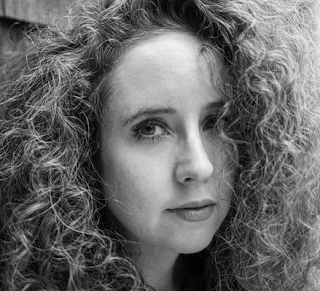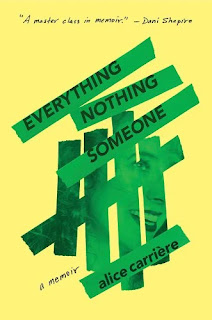Alice Carrière is the author of the new memoir Everything/Nothing/Someone. She lives in Nashville, Tennessee, and Amagansett, New York.
Q: What inspired you to write Everything/Nothing/Someone?
A: I wrote this book because I had to. I have never not been writing this book. I wrote it because I find being alive so strange that I needed to tell someone about it, even if it was just myself. I wrote it to stay alive, to remain curious about the strangeness instead of letting it kill me.
I’ve always metabolized my experiences through storytelling. When I was little, I would think in the third person. I would say, “she is walking down the street, it is raining, the rain falls on her jacket,” narrating myself into existence.
When I started dissociating – unable to recognize my face in the mirror or identify where my voice was coming from – writing was my only tether to reality. This book is an extension of that urgent need. But my motivation changed as I wrote the book and continued to live life. It became less about sustaining myself and more about connecting to others.
Q: How was the book’s title chosen, and what does it signify for you?
A: I was the child of two self-destructive, self-absorbed artists who lived in an alternate universe where they were the exceptions to every rule, where the power of their desires could shape reality. Everything was abstracted, turned into art or theory (including me). I was flooded by the torrential force of their impulses and desires, and I became everything - a child, a mother, a wife, an idea.
When I reached adolescence, a dissociative disorder wiped out the last puff of diffuse self-hood I had, and I became not even no one, but nothing. I couldn’t recognize my face in the mirror, I didn’t know where the words I spoke were coming from, I was completely disconnected from my body, my feelings, my history. I was not real. I didn’t exist. My only tether to reality was writing.
After falling victim to the American psychiatric complex in the form of gross overmedication that caused a near-lethal psychotic episode, I formed a relationship with Gregory, now my husband, himself a recovering addict and alcoholic.
The fastidious care and optimism he brought to my life allowed me to slowly turn outward and be able to help care for and connect with my mother when she was diagnosed with dementia, with the elderly nanny who raised me, and to reunite with my father and listen to his story. I wrote myself into a place where I could feel and feel for others, and I became someone.
I was also inspired by my mother’s fictionalized autobiography called History of the Universe (which makes her, appropriately, the universe). I was inspired by her scope and her arrogance, or maybe the scope of her arrogance, which was directly proportional to her immense fear (of getting close to people, of never being enough, of never having enough).
But I wanted, in both my life and my work, to move away from the alienating force of that grandiosity and self-absorption toward connection with other people and with my Self. The title reflects that movement towards human connection and authenticity, from Everything to Someone.
Q: The comedian and writer Molly Shannon said of the book, “Propulsive, intense, moving, and breathtakingly honest, this searing memoir about family ties, trampled boundaries, and mental illness is completely unforgettable.” What do you think of that description?
A: I think she nailed it, and I’m so thrilled she liked it.
Q: What impact did it have on you to write the book?
A: It saved my life, and it brought me close to the people I love. It gave me back my relationship with my father. I wrote myself into a place of deep deep empathy for my mother. It showed me that many things, many seemingly contradictory things, can be true at the same time and that I can remain coherent in the center of that understanding.
I hope reading it can help people as much as writing it helped me.
Q: What are you working on now?
A: I’m currently working on two novels that were born out of two very practical concerns. I have a lot of anxiety, and I ruminate a lot. There were two specific things I couldn’t stop ruminating on, and it was gradually eating up my life, so I decided to turn my two biggest fears into a novel.
Now my ruminating is actually work, which makes it hurt less and makes it less disruptive. If I’m going to waste so much time being afraid, might as well make it productive.
The other has a similar origin story. It’s about my guilty pleasure. I was wasting time and energy on this one guilty pleasure, so I thought, why not get to immerse myself in it in a way that’s generative?
Q: Anything else we should know?
A: This book is a major overshare. As my publisher says, it sets a new standard for honesty, and, after reading it, you’ll know every single “brutal and illuminating” (to use a line from the starred review from Publishers Weekly) little thing about me and my life, so there’s not much I can add that isn’t already in there!
It’s funny; people ask me how I can be that, often gruesomely, honest. It never occurred to me that I could say anything but everything, and I hope it inspires other people to reach out and say the things they are too afraid to say because it’s often those moments that result in the most profound connections.
--Interview with Deborah Kalb


No comments:
Post a Comment